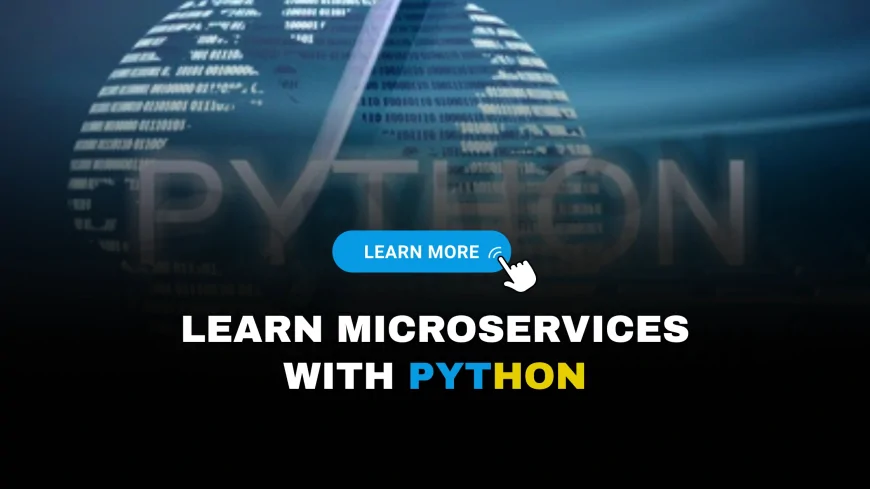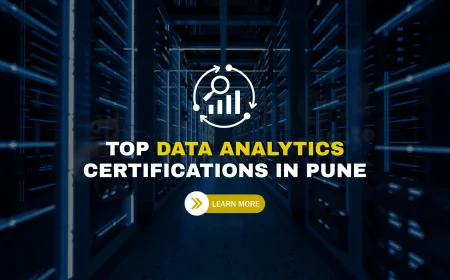Python Microservices Architecture Courses Pune | Advanced Python Microservices Courses Available in Pune
Explore the best Python Microservices Architecture courses in Pune. Learn to build scalable, maintainable microservices with hands-on projects, Docker, Kubernetes, and industry-relevant skills. Join expert-led training programs designed to make you job-ready in Pune's tech ecosystem.

Table of Contents
- Introduction to Python Microservices Architecture
- Why Learn Microservices Architecture with Python?
- Overview of Python Microservices Architecture Courses
- Core Skills Covered in These Courses
- Top Institutes Offering Python Microservices Courses in Pune
- Real-World Projects & Hands-On Training
- Career Opportunities After Microservices Training
- Learning Formats: Online, Offline & Hybrid
- Certifications and Industry Recognition
- Frequently Asked Questions (FAQs)
- Conclusion
Introduction to Python Microservices Architecture
Microservices architecture is revolutionizing software development by breaking large applications into smaller, manageable, and independently deployable services.Python’s ease of use combined with its robust libraries makes it a popular choice for developing microservices. In Pune, the growing tech ecosystem has fueled demand for skilled professionals who can design and develop microservices using Python. Specialized courses now focus on training developers in Python microservices architecture to meet industry needs.
Why Learn Microservices Architecture with Python?
Microservices architecture has become the backbone of modern software development, empowering organizations to build scalable, resilient, and easily maintainable applications. When combined with Python — one of the most popular and versatile programming languages — it creates a powerful synergy for developers aiming to design efficient backend systems.
Here are key reasons why learning microservices architecture with Python is a smart career move:
1. Simplicity and Readability
Python’s straightforward and readable syntax speeds up development, making coding more efficient and less error-prone. This simplicity makes it ideal for breaking down complex systems into smaller microservices without introducing unnecessary complexity.
2. Rich Ecosystem and Libraries
Python offers a vast collection of frameworks and libraries such as Flask, FastAPI, and Django REST Framework, which simplify building RESTful APIs and microservices. These tools provide pre-built components that speed up development and reduce boilerplate code.
3. Rapid Development and Prototyping
Microservices thrive in agile environments where quick iterations are essential. Python’s dynamic nature and extensive support for asynchronous programming help developers prototype and deploy microservices rapidly, adapting swiftly to changing business requirements.
4. Seamless Integration with DevOps Tools
Python scripts are widely used in DevOps automation. When combined with containerization technologies like Docker and orchestration tools like Kubernetes, Python-based microservices integrate seamlessly into modern CI/CD pipelines, enabling efficient deployment and scaling.
5. Scalability and Maintainability
Microservices architecture allows each service to be developed, tested, and deployed independently. Python’s modularity and support for microservices patterns help maintain clean separation of concerns, resulting in scalable and maintainable applications.
6. Growing Industry Demand
Many tech startups, SaaS providers, and enterprises are adopting microservices to build cloud-native applications. Python’s popularity and its alignment with microservices architecture have increased demand for professionals skilled in this domain, especially in tech hubs like Pune.
7. Cross-Domain Applications
Python microservices are not limited to web applications. They are increasingly used in AI/ML deployments, IoT systems, financial tech, and data pipelines, broadening the career horizons for learners.
In essence, learning microservices architecture with Python equips you with a versatile skill set that combines modern software design principles with a powerful, easy-to-learn programming language—preparing you for a future-proof career in software development.
Overview of Python Microservices Architecture Courses
Courses designed around Python microservices typically cover fundamental microservice principles, RESTful APIs, asynchronous programming, containerization, orchestration, monitoring, and security. Pune’s top training providers include live sessions, hands-on labs, and project work focused on building scalable microservices with Python frameworks like Flask, FastAPI, or Django REST Framework.
Curriculum generally includes:
- Microservices basics and architectural patterns
- Python frameworks for building microservices
- API design and REST principles
- Message brokers like RabbitMQ, Kafka
- Containerization with Docker
- Orchestration using Kubernetes
- Service discovery and load balancing
- Monitoring, logging, and debugging microservices
- Security best practices for microservices
Core Skills Covered in These Courses
- Python proficiency: Advanced Python programming and ecosystem tools
- API Development: Building RESTful and event-driven APIs
- Microservices Design: Decomposition strategies and patterns
- Containers and DevOps: Docker, Kubernetes basics, CI/CD pipelines
- Messaging Systems: Implementing asynchronous communication using message brokers
- Security: Authentication, authorization, and data encryption
- Testing & Debugging: Unit, integration tests, and monitoring microservices
Top Institutes Offering Python Microservices Courses in Pune
Pune hosts several reputed institutes providing specialized Python microservices training:
WebAsha Technologies:
Location: Mathura Nagar, Wadgaon Sheri, Pune, Maharashtra 411014
Website: www.webasha.com
WebAsha Technologies is a renowned training institute in Pune, specializing in Python programming and its applications in various domains, including microservices architecture. They offer comprehensive courses designed to equip learners with the skills needed to design, develop, and deploy microservices using Python.
Course Highlights
-
Curriculum Focus: The course covers essential topics such as RESTful API development, containerization with Docker, orchestration with Kubernetes, and service communication protocols.
-
Hands-On Projects: Students engage in real-world projects that simulate industry scenarios, enhancing practical knowledge and problem-solving skills.
-
Flexible Learning Modes: WebAsha offers both online and offline training options to cater to diverse learning preferences.
-
Certification: Upon successful completion, participants receive a globally recognized certification, validating their expertise in Python microservices.
Experienced Trainers
The trainers at WebAsha are industry professionals with over 12 years of experience in Python and microservices architecture. They bring practical insights and up-to-date knowledge, ensuring that students receive high-quality education.
Placement Assistance
WebAsha provides dedicated placement support, including resume building, mock interviews, and job referrals. With a strong network in the industry, they have successfully placed numerous students in reputed organizations.webasha.com
Real-World Projects & Hands-On Training
Most courses emphasize project-based learning to develop practical skills. Typical projects include:
- Building an e-commerce microservices backend with Flask
- Creating a microservices-based chat application
- Designing API gateways with authentication and rate limiting
- Deploying containerized microservices using Docker and Kubernetes
- Implementing message queues for asynchronous communication
Career Opportunities After Microservices Training
Completing a Python microservices architecture course opens multiple career avenues:
- Python Microservices Developer
- Backend Developer
- DevOps Engineer
- Cloud Engineer
- Site Reliability Engineer (SRE)
- Software Architect
These roles are in high demand in Pune’s IT startups, product firms, and service providers who leverage cloud-native applications and scalable architectures.
Learning Formats: Online, Offline & Hybrid
Courses in Pune are offered in various formats to accommodate different learning preferences:
- Offline Classroom: Immersive experience with direct mentorship, popular in tech parks like Hinjewadi and Magarpatta.
- Online Live Classes: Flexibility to learn from home with interactive sessions and recorded lectures.
- Hybrid: Combination of online theory and offline labs for hands-on practice.
Certifications and Industry Recognition
Completing a course typically provides a certification from the training institute. Many also help prepare for external certifications such as:
- Certified Kubernetes Application Developer (CKAD)
- Docker Certified Associate
- Python Institute Certifications (PCAP)
- Cloud provider certifications (AWS, Azure, GCP) focusing on microservices deployment
Frequently Asked Questions (FAQs)
1. What is microservices architecture?
Microservices architecture breaks applications into smaller, loosely coupled services that can be developed, deployed, and scaled independently.
2. Why use Python for microservices?
Python offers simplicity, rapid development, and a rich ecosystem of libraries that make it ideal for building scalable microservices.
3. Do I need prior Python experience to join these courses?
Basic Python knowledge is recommended, but some courses offer beginner-friendly modules.
4. How long do these courses typically last?
Duration ranges from 2 to 4 months depending on course intensity and batch schedule.
5. Are these courses suitable for working professionals?
Yes, many institutes offer flexible evening and weekend batches.
6. Will I get hands-on experience?
Yes, projects and live labs form a crucial part of the curriculum.
7. Do these courses include DevOps training?
Most microservices courses cover Docker and Kubernetes basics essential for deployment and orchestration.
8. Can I pursue certification after this training?
Many institutes offer course completion certificates and support for third-party certifications.
9. What career opportunities are available after course completion?
Roles such as Microservices Developer, Backend Developer, DevOps Engineer, and Cloud Engineer are common.
10. Is the course theoretical or practical?
The courses emphasize practical skills with real-world projects and coding assignments.
11. What Python frameworks are taught?
Flask, FastAPI, and Django REST Framework are commonly covered.
12. Are there placement services?
Many Pune institutes provide placement assistance, mock interviews, and resume building.
13. Is prior knowledge of Docker required?
No, Docker concepts are introduced from basics as part of the course.
14. Can I learn microservices without a computer science degree?
Yes, as long as you have programming fundamentals and are willing to learn.
15. Do courses cover API gateways and security?
Yes, designing secure APIs and using API gateways is an important topic.
16. Are online courses as effective as classroom training?
With interactive live sessions and hands-on labs, online courses can be equally effective.
17. What tools and IDEs are used?
PyCharm, Visual Studio Code, Postman, Docker CLI, and Kubernetes dashboard are common tools.
18. Can I get internship opportunities through these courses?
Some institutes tie up with startups and companies to provide internships.
19. How is microservices different from monolithic architecture?
Microservices break down applications into smaller independent units, while monolithic apps are single large codebases.
20. What’s the future scope of Python microservices?
With cloud adoption increasing, Python microservices will continue to be highly relevant for scalable and maintainable application development.
Conclusion
Python Microservices Architecture courses in Pune provide a robust path for developers and IT professionals aiming to master modern software architecture and scalable backend development. These courses blend Python programming, cloud-native tools, and container orchestration into a practical learning experience tailored to current industry demands. With Pune’s booming tech industry, gaining expertise in microservices architecture positions you for rewarding roles and career growth in emerging cloud and distributed systems domains.
What's Your Reaction?
 Like
0
Like
0
 Dislike
0
Dislike
0
 Love
0
Love
0
 Funny
0
Funny
0
 Angry
0
Angry
0
 Sad
0
Sad
0
 Wow
0
Wow
0














